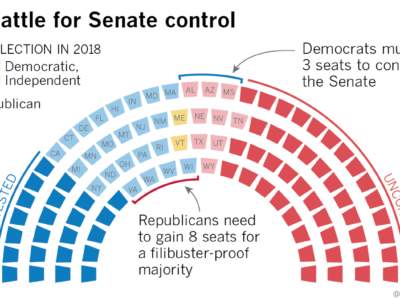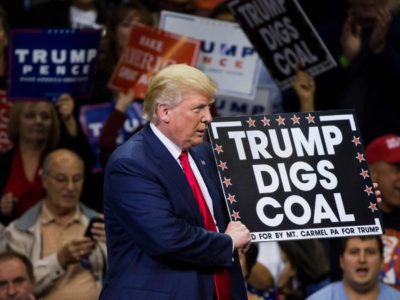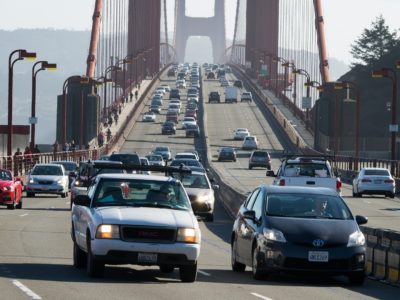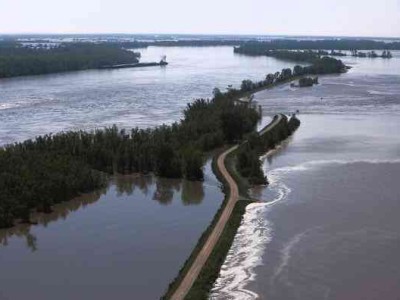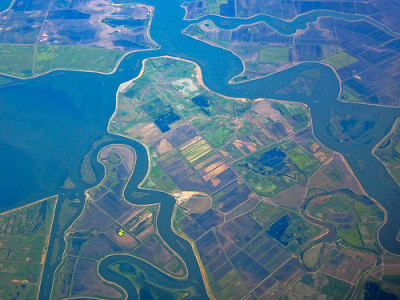Senate Races and the Environment
Eight races will determine the balance of power in the Senate.
There's a lot riding on the 2018 elections. The midterms will decide whether the GOP has a large enough majority to pass legislation weakening environmental protection, whether either house of Congress is willing to investigate misconduct by Pruitt and others, and who Trump can appoint to agencies and the judiciary. I’ll post more detailed information about the races as we get closer to the election, but here’s a quick overview of eight crucial races. Seats current...
CONTINUE READINGTribal Fishing/Environmental Justice Rights Prevail After Supreme Court Ruling
Justice Kennedy's Recusal Proves Decisive in Preserving Tribes' Legal Victory
Perhaps the most consequential environmental case of the rapidly-concluding U.S. Supreme Court Term ended this week with a whimper rather than a bang: in a curt one-sentence order, the Court ruled that the Ninth Circuit Court of Appeals' earlier decision in Washington v. United States "is affirmed by an equally divided Court." The justices split 4-to-4 on how to resolve this important case involving Native American fishing rights, declining salmon populations an...
CONTINUE READINGThe Puzzle of Capacity Markets
What are capacity markets and why do they matter?
If you live in the Midwest, East of the Mississippi and North of the Mason-Dixon line, or in Arkansas or Louisiana, the companies that generate your electricity are covered by what are called capacity markets. I'll bet you didn't know that. That's actually part of the problem, because there's very little transparency and hence little accountability for these policies. The main reason these capacity markets matter, at least from my point of view, is the way they re...
CONTINUE READINGA Trumped-Up Bailout Plan
Legally deficient? Arbitrary? Disguised special interest favors? All par for the course in this Administration.
You couldn’t ask for a more typical example of the Trump Administration at work. Nuclear and coal plants are being closed across the country, unable to compete with cheap natural gas and increasingly cheap renewables. In a desperate effort to support the coal industry, Trump wants to force consumers to subsidize these plants. It’s not surprising that he’s jumped at this bailout plan, because it echoes so many of the Administration’s themes. You might be su...
CONTINUE READINGWhat Does Sports Gambling Have To Do With Environmental Law?
A Lot, Potentially, Following the Supreme Court's Murphy v. NCAA Decision
Recently, the U.S. Supreme Court issued a major decision invalidating a federal statute that had prohibited states from allowing betting on competitive sporting events. Murphy v. National Collegiate Athletic Association, is one of those relatively rare Supreme Court decisions that directly affects a substantial portion of the American public. So it's no great surprise that the Murphy case and its impact on sports betting in America have been heavily publicized a...
CONTINUE READINGScenarios
We live in an uncertain world. Scenario planning can help.
When Shell Oil produced a sophisticated scenario of the path to a carbon neutral world in 2070, a lot people took notice. Shell concluded that the “relevant transformations in the energy and natural systems require concurrent climate policy action and the deployment of disruptive new technologies at mass scale within government policy environments that strongly incentivize investment and innovation.” Shell has long been a leader in scenario planning in the business w...
CONTINUE READINGCARB Seeks to Maintain Stringency of California’s Vehicle Standards
Emmett Institute submits public comment in support of CARB’s efforts
Back in the halcyon days of 2012 when EPA, NHTSA, California, and the automakers crafted a grand bargain to adopt national vehicle emission standards, California agreed that compliance with vehicle emission standards adopted at the federal level would be “deemed to comply” with California’s standards. Now, as it becomes clear that the federal government intends to go forward with its legally indefensible plan to significantly weaken those standards, CARB is ...
CONTINUE READINGWhat Trump Gives Appalachia With One Hand, He Takes Away with the Other
Ryan Zinke's public land policies are accelerating the decline of eastern coal.
There is no one who Trump loves more than coal miners, and he has surrounded himself with Appalachian coal miners on important occasions. One of his most fervent pledges was to "end the war on coal." Yet, Trump's public lands policies are helping to accelerate the decline of eastern coal. A recent study by researchers at Resources for the Future unpacks he problems besetting eastern coal jobs. They modeled the profitability of eastern coal mines: "This analysis uti...
CONTINUE READINGFlood Safety, Infrastructure, and the Feds
Standards for levees, seawalls, and other infrastructure urgently need attention.
The federal government is responsible for responding to major floods and runs the federal flood insurance program. It also has millions of dollars of its own infrastructure at risk from floods. Yet the government is failing to deal effectively with flood risks before the fact. Let's begin with the levees that are the main defense against flooding. There are over 100,000 miles of levees across the United States, including about a fifth of all U.S. counties, many of w...
CONTINUE READINGAttempting to Close the Floodgates of Litigation
Can Congress prevent state and federal courts from hearing WaterFix lawsuits?
The journey of California’s proposed delta tunnels project (also known as California WaterFix) has been anything but straightforward and already faces a slew of ongoing legal challenges.[i] Last week, Congress added a different kind of twist when the proposed Department of Interior budget for FY 2019 was introduced in the House Appropriations Committee. The relevant language is found in Section 437, on the second-to-last page of the bill draft: Notwithstanding any ot...
CONTINUE READING



